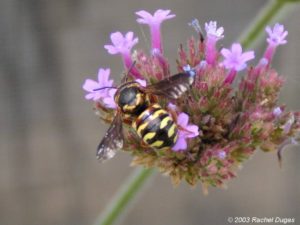 From ‘Bees of the World, editor Fran Bach
From ‘Bees of the World, editor Fran Bach
Help bees by restoring natural landscapes, roadside planting, green belts, green roofs and urban gardening initiatives. As a county with an economy strongly tied to agriculture, Solano County should care greatly about the health and well-being of bees. Educating local residents on ways to improve local living conditions for bee populations was the aim of a highly popular program being hosted by Solano Land Trust at Rush Ranch, recently. The program, moderated by University of California, Davis Professor Emeritus Robbin Thorp, helped define exactly what bees are and aren’t, identified some different varieties and ways to help support those bee populations. Related to wasps, which are carnivorous, Thorp said that bees, “are simply wasps that have gone vegan,” relying on pollen and nectar as a food source. Another key difference is that bees, unlike wasps, not only collect pollen but are adapted to do so efficiently. Bees have branched hairs on their bodies, which wasps do not, aiding in their capacity to carry pollen. Likewise, bees generate an electrostatic charge when they fly, helping pollen cling to them. The most surprising fact for many was the wide variety of bee species. Most people likely associate bees with the creatures that make honey, but there are between 20,000 to 30,000 bee species in North America, which is more than the total number of species of birds, mammals, reptiles and amphibians combined.
Original article in Beeculture by Bill Hicks. Link to article.
